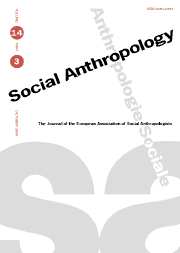Article contents
Football cultures
Published online by Cambridge University Press: 01 June 2000
Abstract
Entering the field. New perspectives on world football. Edited by Gary Armstrong and Richard Giulianotti. Oxford: Berg. 1997. 319 pp. Hb.: £14.95. ISBN 1 85973 198 8.
Until a few years ago, dedicating an academic volume to the anthropology of football would have seemed a mere diversion, little more than an intellectual whim. In spite of their important social repercussions, sports in general and football in particular were considered minor, even irrelevant, objects of study. Condemned by the majority of intellectuals as an ‘opium of the people’ at the service of the authoritarian or democratic powers that be, academics ceded the sporting terrain to other more or less organic intellectuals, such as sports journalists and a few assorted essayists and writers (such as Eduardo Galeano [1995] and Manuel Vazquez Montalban [1995], who have published poetic accounts of football and its metaphors). Until recently, only one of the many aspects of the football scene, not surprisingly its most problematic and morbid, had captured the attention of social researchers: stadium violence associated with hooliganism. One might ask, then, echoing Marc Augé (1982: 59), if ‘the timidity of the human sciences with regard to important modern day rituals is not due to the fact that those who would observe and analyse such rituals are too close to them?’ However, as Fabio Dei (1992: 7) has pointed out, ‘the anthropological relevance of football is related to its strong affinity with a series of classic themes in the discipline: ritual, sacrifice, violence, symbolic communication, etc’. Why have anthropologists, specialists in distant peoples and exotic rituals, taken so long to visit tribes much closer to home, yet perhaps no less exotic? By considering the football tribes of Manchester United, Flamengo or Football Club Barcelona, anthropologists can observe modern forms of totemism and segmentarity.
- Type
- Review Article
- Information
- Copyright
- © 2000 European Association of Social Anthropologists
- 3
- Cited by




